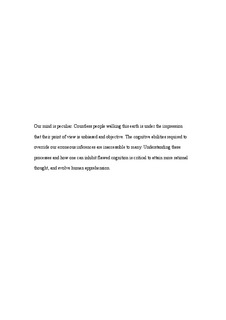Rationality and perception: an experimental study of telelogical thinking, cognitive reflection and pattern perception
Master thesis
Permanent lenke
http://hdl.handle.net/11250/2400127Utgivelsesdato
2015Metadata
Vis full innførselSamlinger
- Institutt for psykologi [3140]
Sammendrag
The author presents an experiment which tests whether lacking control increases illusory pattern perception and teleological thinking. Illusory pattern perception is defined as the identification of meaningful interrelationship among a set of random stimuli. Teleological thinking is the tendency humans have to favor purpose- and intention-based explanations of natural phenomena. Participants manipulated to feel a lack of control display a significantly more conservative bias and lower performance rate than the baseline participants on the pattern task. Evidence for the suggested direction of illusory pattern perception and the theorized compensatory mechanism is not found, failing to replicate earlier research. Lacking control does not increase teleological thinking or affect decision criterion in our participants, but the Norwegian participants, especially females, displayed a bias to favor invalid intention- and functional based explanations of nature, independent of the manipulation. The duration of the manipulation paradigm is investigated, noncontingent feedback as means to induce low control, providing relevant data for future research. The author also replicates earlier found gender differences on the cognitive reflection test (CRT), with males tending to perform better, and discusses the implications of the findings in detail.
